

Social interaction is important to keep both mind and body healthy. Ageing Well: Loneliness and Isolation Case Studies. 2019.06.14 loneliness and social isolation in canada angusreid. October 2014 - Loneliness and social isolation - Results — Relationships Australia. Previous research finds that…
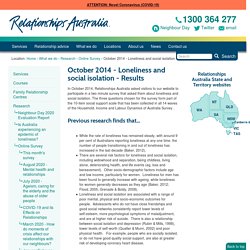
Loneliness and Social Isolation in the United States, the United Kingdom, and Japan: An International Survey – Section 1: Characteristics and Experiences of Those Who Report Often Feeling Lonely or Socially Isolated – 9229. Prevalence of Loneliness and Social Isolation Consequences of loneliness: Many Americans who always or often feel lonely say it affects their physical and mental health, relationships and work, per @KaiserFamFound survey w/@Economist More than a fifth of adults in the U.S. (22 percent) and the U.K. (23 percent) say they often or always feel lonely, feel that they lack companionship, feel left out, or feel isolated from others, about twice the share in Japan (nine percent), referred to here as those reporting loneliness or social isolation.
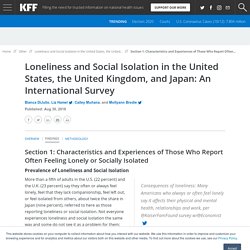
Not everyone experiences loneliness and social isolation the same way and some do not see it as a problem for them; however, most of those reporting loneliness across the U.S., the U.K., and Japan do. About one in twenty across countries say their loneliness is a “major” problem for them. Viewcontent. Singapore’s Elderly Loneliness Epidemic. By Kayla Toh Epoch Times Staff Mr Hoong Hing Weng’s soft eyes gazed at a group of young children playing in the distance.
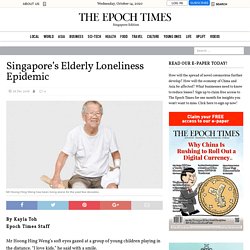
“I love kids,” he said with a smile. Wearing a plain white T-shirt and brown shorts, Mr Hoong, 82, has been living in Chinatown most of his life – alone. He has no children. He divorced his wife in 1973, after a 10-year marriage. Like Mr Hoong, the number of seniors (aged 65 and above) living alone has tripled – from 14,500 in 2000 to 42,100 in 2014. The increasing prevalence of solo elderly households is due to a plethora of factors: Singapore’s ageing population, small family structures as a result of the low birth rate, divorce, or the breakdown of family relationships. Like most of the elderly in Chinatown, Mr Hoong spends the twilight of his life going for walks, sleeping, and chatting with people in the neighbourhood. Mr Hoong previously worked as a crane operator and driver until his retirement in his 60s. Related. Mortality of older persons living alone: Singapore Longitudinal Ageing Studies.
Health Effects of Social Isolation and Loneliness – Aging Life Care Association™ Clifford Singer, MD Adjunct Professor, University of Maine Chief, Geriatric Mental Health and Neuropsychiatry Acadia Hospital and Eastern Maine Medical Center 268 Stillwater Avenue Bangor Maine 04402 207.973.6179 csinger@emhs.org Cliff Singer is a geriatrician and psychiatrist.
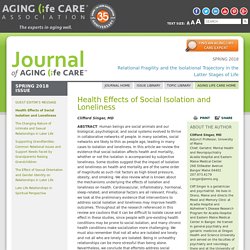
The loneliness of social isolation can affect your brain and raise dementia risk in older adults. Physical pain is unpleasant, yet it’s vital for survival because it’s a warning that your body is in danger.
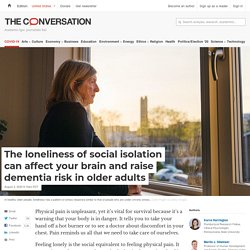
It tells you to take your hand off a hot burner or to see a doctor about discomfort in your chest. Pain reminds us all that we need to take care of ourselves. Feeling lonely is the social equivalent to feeling physical pain. It even triggers the same pathways in the brain that are involved in processing emotional responses to physical pain. Just like feeling physical pain, feeling lonely and disconnected from others is also a signal that we need to take care of ourselves by seeking the safety and comfort of companionship. As scholars at the Center for Healthy Aging at Penn State, we study the impact of stress on the aging body and brain, including how it can worsen cognitive decline and risk for dementia. The health consequences of loneliness The COVID-19 pandemic has put many older adults’ social lives on hold, leaving them at greater risk for loneliness.
Where are the patient advocates? The negative effect of social isolation on older patient care during COVID. A new study by researchers at the University of Michigan School of Nursing found that social isolation of older adult patients from their families and providers during the pandemic compromises the quality of patient care in all settings: hospital, outpatient and assisted living.
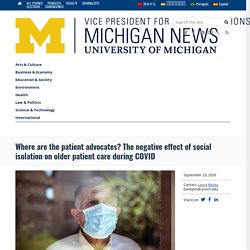
Clinical faculty members Karen Harden, Deborah Price, Heidi Mason and April Bigelow, clinical associate professor, discuss their findings and offer ideas to offset the negative effects of the ongoing COVID-related social isolation. Their study, COVID-19 Shines a Spotlight on the Age-Old Problem of Social Isolation, appears in the Journal of Hospice and Palliative Nursing. Can you give a couple examples from your study of how the state-mandated social isolation restrictions hurt patient care? Deborah Price Price: In the inpatient example, the 83-year-old male patient was admitted to the hospital for chemotherapy for abdominal cancer.
We also looked at a long-married couple in assisted living. Social isolation and loneliness among older adults in the context of COVID-19: a global challenge. Social isolation is defined as the objective state of having few social relationships or infrequent social contact with others while loneliness is a subjective feeling of being isolated.
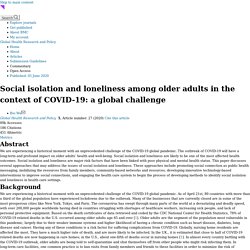
Social isolation and loneliness are serious yet underestimated public health risks that affect a significant portion of the older adult population. In the U.S., approximately one-quarter of community-dwelling older adults are considered to be socially isolated, and 43% of them report feeling lonely [2]. The COVID-19 pandemic is increasing the number of older adults who are socially isolated including both community-dwelling older adults and nursing home residents, as many countries have issued stay-at-home orders and banned visits for nursing home residents. Prior to the disease outbreak, the vast major of community-dwelling older adults actively participated in social activities, such as attending senior centers, churches activities, traveling, and many other social events.